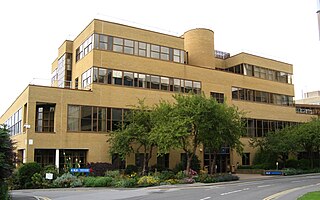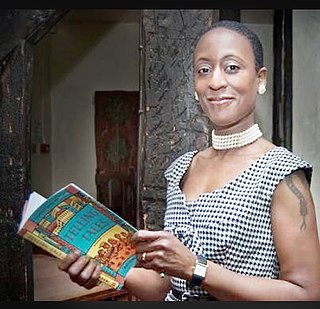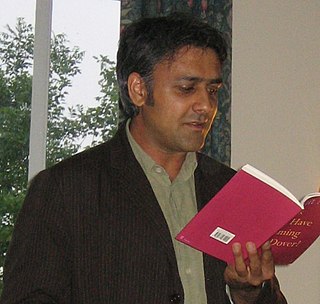Related Research Articles

Dame Carol Ann Duffy is a British poet and playwright. She is a professor of contemporary poetry at Manchester Metropolitan University, and was appointed Poet Laureate in May 2009, resigning in 2019. She is the first woman, the first Scottish-born poet and the first known LGBT poet to hold the position.

AQA, formerly the Assessment and Qualifications Alliance, is an awarding body in England, Wales and Northern Ireland. It compiles specifications and holds examinations in various subjects at GCSE, AS and A Level and offers vocational qualifications. AQA is a registered charity and independent of the government. However, its qualifications and exam syllabi are regulated by the Government of the United Kingdom, which is the regulator for the public examinations system in England and Wales.

Patience Agbabi FRSL is a British poet and performer who gives particular emphasis to the spoken word. Although her poetry hits hard in addressing contemporary themes, it often makes use of strong formal constraints, including traditional poetic forms. She has described herself as both "bicultural" and bisexual. Issues of racial and gender identity feature prominently in her poetry. She is celebrated "for paying equal homage to literature and performance" and for work that "moves fluidly and nimbly between cultures, dialects, voices; between page and stage." In 2017 she was elected a Fellow of the Royal Society of Literature.

The International General Certificate of Secondary Education (IGCSE) is an English language based examination similar to GCSE and is recognized in the United Kingdom as being equivalent to the GCSE for the purposes of recognizing prior attainment. It was developed by University of Cambridge International Examinations. The examination boards Edexcel and OxfordAQA also offer their own versions of International GCSEs. Students normally begin studying the syllabus at the beginning of Year 10 and take the test at the end of Year 11. However, in some international schools, students can begin studying the syllabus at the beginning of Year 9 and take the test at the end of Year 10.
Gillian Clarke is a Welsh poet and playwright, who also edits, broadcasts, lectures and translates from Welsh into English. She co-founded Tŷ Newydd, a writers' centre in North Wales.
"Havisham" is a poem written in 1993 by Carol Ann Duffy. It responds to Charles Dickens' character Miss Havisham from his novel Great Expectations, looking at Havisham's mental and physical state many decades after being left standing at the altar, when the bride-to-be is in her old age. It expresses Havisham's anger at her fiancé and her bitter rage over wedding-day trauma and jilted abandonment. Duffy's use of language is very powerful and passionate. Throughout the poem oxymorons and juxtaposition such as "Beloved sweetheart bastard" and "Love's hate" portrays the ambivalence and restless uncertainty of the character, while a sexual fantasy reveals both the unrequited love and the passion that remains within Havisham following the wedding, a devastation from which her heart has never recovered.
Grace Nichols FRSL is a Guyanese poet who moved to Britain in 1977, before which she worked as a teacher and journalist in Guyana. Her first collection, I is a Long-Memoried Woman (1983), won the Commonwealth Poetry Prize.

Imtiaz Dharker is a British poet, artist and video film maker. She has won the Queen's Gold Medal for her English poetry and was appointed Chancellor of Newcastle University from January 2020. In 2019, she was considered for the position of Poet Laureate following the tenure of Carol Ann Duffy, but withdrew herself from contention in order, as she stated, to maintain focus on her writing."I had to weigh the privacy I need to write poems against the demands of a public role. The poems won," said Dharker. For many Dharker is seen as one of Britain's most inspirational contemporary poets. She was elected a Fellow of the Royal Society of Literature in 2011. In the same year, she received the Cholmondeley Award from the Society of Authors. In 2016 she received an Honorary Doctorate from SOAS University of London.

The Assessment and Qualifications Alliance has produced Anthologies for GCSE Latin and English Literature studied in English schools. This follows on from AQA's predecessor organisations; Northern Examinations and Assessment Board (NEAB) and Southern Examining Group (SEG).
John Agard FRSL is an Afro-Guyanese playwright, poet and children's writer, now living in Britain. In 2012, he was selected for the Queen's Gold Medal for Poetry.

Daljit Nagra FRSL is a British poet whose debut collection, Look We Have Coming to Dover! – a title alluding to W. H. Auden's Look, Stranger!, D. H. Lawrence's Look! We Have Come Through! and by epigraph also to Matthew Arnold's "Dover Beach" – was published by Faber in February 2007. Nagra's poems relate to the experience of Indians born in the UK, and often employ language that imitates the English spoken by Indian immigrants whose first language is Punjabi, which some have termed "Punglish". He currently works part-time at JFS School in Kenton and visits schools, universities and festivals where he performs his work. He was appointed chair of the Royal Society of Literature in November 2020.

The World's Wife is a collection of poetry by Carol Ann Duffy, originally published in the UK in 1999 by both Picador and Anvil Press Poetry and later published in the United States by Faber and Faber in 2000.

The National Poetry Competition is an annual poetry prize established in 1978 in the United Kingdom. It is run by the UK-based Poetry Society and accepts entries from all over the world, with over 10,000 poems being submitted to the competition each year. Winning has been an important milestone in the careers of many well-known poets.
Examination boards in the United Kingdom are the examination boards responsible for setting and awarding secondary education level qualifications, such as GCSEs, Standard Grades, A Levels, Highers and vocational qualifications, to students in the United Kingdom.
The General Certificate of Education (GCE) Advanced Level, or A Level, is a main school leaving qualification in England, Wales, Northern Ireland, the Channel Islands and the Isle of Man. It is available as an alternative qualification in other countries.
"Search for My Tongue" is a poem by Sujata Bhatt. The poem is studied in England as part of the AQA Anthology.
"Two Scavengers in a Truck, Two Beautiful People in a Mercedes" is a poem by American poet Lawrence Ferlinghetti. Up until 2010, the poem was studied by English school children as part of the GCSE AQA Anthology.
"Elvis's Twin Sister" is a poem by Carol Ann Duffy that is said to reflect "the hidden lives of generations of overlooked women" as part of the collection The World's Wife, of 30 similar poems dealing with the female relatives of famous men throughout history. The poem is sometimes studied by schoolchildren in the United Kingdom as part of the AQA syllabus for GCSE English.
Poetry Live, also known as Poetry Live! for GCSE, is a series of annual events in venues across the UK where poets perform their poetry to English school children.

Rapture is a collection of poetry written by the Scottish poet Carol Ann Duffy, the British poet laureate from 2009 to 2019. It marks her 37th work of poetry and has been described as "intensely personal, emotional and elegiac, and markedly different from Duffy’s other works" by the British Council. Rapture was first published in 2005 in the UK by Picador, and in 2013 in the US, by Farrar, Straus, and Giroux.
References
- ↑ Andrew Moore (1955-12-23). "Carol Ann Duffy-AQA Anthology for GCSE". Teachit.co.uk. Archived from the original on 2009-03-05. Retrieved 2009-08-17.
- ↑ "Carol Ann Duffy". Williamhoward.cumbria.sch.uk. Archived from the original on April 16, 2009. Retrieved 2009-08-17.
- 1 2 3 4 "UK | Education | GCSE poem dropped over knife fear". BBC News. 2008-09-03. Retrieved 2009-08-17.
- 1 2 Andrew Moore (1955-12-23). "Carol Ann Duffy-AQA Anthology for GCSE". Teachit.co.uk. Archived from the original on 2009-03-05. Retrieved 2009-08-17.
- 1 2 Curtis, Polly (2008-09-04). "Top exam board asks schools to destroy book containing knife poem | Education". London: The Guardian. Retrieved 2009-08-17.
- ↑ Addley, Esther (2008-09-06). "Poet's rhyming riposte leaves Mrs Schofield 'gobsmacked' | Education". London: The Guardian. Retrieved 2009-08-17.
- ↑ Logged in as click here to log out (2008-07-29). "Francis Gilbert: Why I will teach Education for Leisure by Carol Ann Duffy | Comment is free | guardian.co.uk". London: Guardian. Retrieved 2009-08-17.